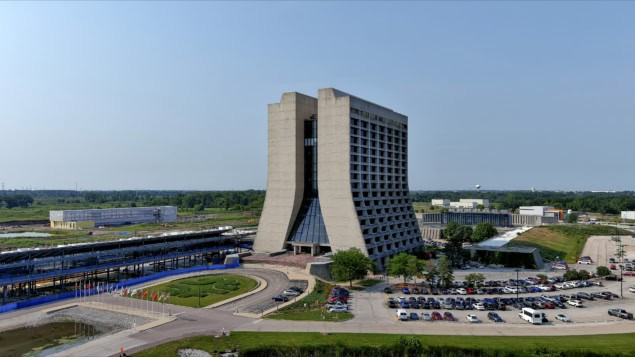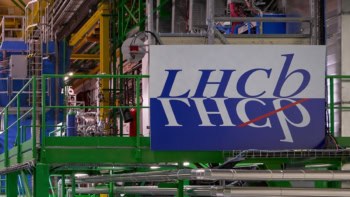
A group of self-styled “whistleblowers” at Fermilab, the US’s premier particle-physics facility, is claiming that the lab is in “crisis” and that “without a complete [management] shake-up” it is “doomed”. Published in the form of a 113-page “white paper” on the arXiv pre-print server, the criticism comes as the US Department of Energy (DOE), which funds Fermilab, is preparing to announce a new contractor to manage the day-to-day running of the lab.
The paper has been written by disgruntled staff members and visiting experimentalists, who in December 2023 set up a think tank to help Fermilab overcome what they called its “mission and physics impasses”. The authors, who are anonymous, say they have based their report on interviews and surveys of employees at the lab. It has, however, been formally signed by Giorgio Bellettini, who worked at Fermilab in the 1980s and 2010s, and neutrino physicist William Barletta from the Massachusetts Institute of Technology.
A Fermilab spokesperson told Physics World that the lab’s leadership is taking “seriously” the issues raised in the report and the current dissatisfaction among some staff. “They are assessing the situation and working to improve staff satisfaction,” the spokesperson says, adding that current director Lia Merminga conducted a staff climate survey when she took up office in 2022. That resulted in “some of the most pressing issues” being addressed and led to a “culture of excellence initiative” being established that will begin in full next year. Its goal is a “measurable improvement” in staff satisfaction within a year.
Limited operations
With more than 2000 staff, Fermilab has been managed since 2007 by Fermi Research Alliance (FRA) – a group that combines the University of Chicago and the Universities Research Association (URA). Serving the DOE’s Office of Science, the group’s remit is to guide the scientific direction of the lab. With the Tevatron proton-antiproton collider having been decommissioned in the 2010s, Fermilab is now repositioning itself as a leader in neutrino science.
The lab’s accelerator complex is currently undergoing a major upgrade for the $1.5bn Long-Baseline Neutrino Facility, which will study the properties of neutrinos in unprecedented detail and examine the differences in behaviour between neutrinos and antineutrinos. It will do so by sending neutrinos towards the Deep Underground Neutrino Experiment (DUNE) in a former gold mine in South Dakota some 1300 km away.
Hopefully, the [report] will raise an aggressive discussion within DOE and the lab management leading to substantial improvements in how the lab programme is presently conceived and performed
Giorgio Bellettini
Despite progress on this front, the lab has recently faced a number of challenges. In a 2021 assessment, the DOE gave Fermilab an overall mark of “B”, which fell below the required “B+”. Meanwhile DUNE gained only a “C”, mainly owing to delays and cost overruns. Complaints also emerged in 2022 over Fermilab continuing to restrict access to its campus for scientists and members of the public, despite COVID-19, which had prompted the original restrictions, having become less of a concern.
The [whistleblower] document asserts various challenges at Fermilab, some of which are inaccurate, and others of which [the Fermi Research Alliance] has been working hard to address for some time
Lia Merminga
Then in mid-June, Fermilab’s leadership told an all-hands meeting that the lab would close a significant part of its operations between 26 August and 8 September to reduce a budgetary shortfall. During that time staff would have to take their holidays. Following protests over the decision and “through the active engagement of DOE and FRA”, Fermilab later announced that, rather than closing, it would instead undergo “a limited operations period” for maintenance and repairs during the week of 26 August.
”The majority of Fermilab staff will be on leave and the lab will be closed to the public”, bosses declared.
“Too many deficiencies”
In the new whistleblower report, the group claims there are “too many deficiencies in the culture and behavioural areas” at Fermilab. They point, for example, to the lab’s dismissal of an early-career researcher in 2023 who had alleged sexual assault in 2018, and raised several cover-ups by management of dangerous behaviour. The report also highlights a case of guns being brought onto Fermilab’s campus in 2023; a male employee’s attack on a female colleague using an industrial vehicle in 2022; and retaliation against an employee who had predicted and warned management about the failures of beryllium windows.
The report in addition accuses FRA of lacking state-of-the art processes for business, finances and procurement. This “management ineffectiveness”, the whistleblowers charge, has caused a series of “self-inflicted problems” including unfilled positions in important scientific and administrative leadership positions; “serious” budget overruns and delays in key experiments; and several administrative obstacles that slow down or even stop experiments’ scientific productivity. The consequence, the report concludes, is “budget insolvency, with the lab being very much in the red”. Lia Merminga: directing the future of Fermilab
The whistleblowers also say they recently carried out a survey of Fermilab staff, which supposedly found that “a large fraction” are “unhappy” with management and are “desperately looking for change”. The survey, the authors claim, also revealed “poor communication between management and employees, and a decline of trust in management”.
“After so many years at Fermilab, I have developed a deep sentimental involvement with the laboratory, and I sense a diffused lack of confidence in our future,” writes Bellettini in a foreword to the report. “The data of the past 15 years show that responding to demands for a change by delaying any incisive action is not productive. It is not leading to a rousing vision for [high energy physics] in the United States.”
Calling for change
Although Merminga was unavailable for an interview with Physics World for this story, in a message to Fermilab’s employees on 29 July, which has been seen by Physics World, she stated that “the [whistleblower] document asserts various challenges at Fermilab, some of which are inaccurate, and others of which FRA has been working hard to address for some time”. Merminga added that she plans to discuss the issues with staff and then “communicate some of the progress we are making.”
The Fermilab spokesperson also states that access to the Fermilab site for both staff and members of the public “has improved significantly over the last year with updated and streamlined processes” in a bid to improve confidence and trust in the lab.
The issues at Fermilab are, however, also hindering the DOE, which earlier this year called for bids on the contract to operate the lab. The University of Chicago and the URA have submitted a contract bid together with other partners. Associated Universities, Inc., which runs the US-based 100 m-diameter Green Bank Telescope and the Atacama Large Millimeter/submillimeter Array in Chile, has also thrown its hat in the ring. The DOE says it will announce the winner of the contract by 30 September. Fermilab faces protest over visitor restrictions
The whistleblowers, however, are calling for more than just a change of contractor. They say management should replace Merminga given that she has “[failed] to respond effectively to setbacks [and has] only made things worse”. “A new management team, one hopes, would be motivated to solve problems and would enjoy a ‘honeymoon period’, enabling them to make positive changes more easily,” the report states.
Bellettini, meanwhile, told Physics World that he has not received a response to the report from Fermilab’s management. “Hopefully, the [report] will raise an aggressive discussion within DOE and the lab management leading to substantial improvements in how the lab programme is presently conceived and performed,” he says. “The time to act is now.”
- This article was amended on 15 August 2024 to clarify the role of the FRA’s constituent organizations in bidding for the next contract, and to correct the date that Lia Merminga became Fermilab’s director. It was also amended on 19 August 2024 to make clear the report included the views of visiting experimentalists at Fermilab.





